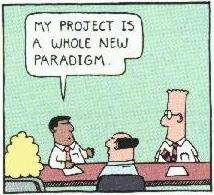The ASPLOS Wild and Crazy Ideas SessionTuesday, October 6th |
||
| ||
|
The problem:The field of computer architecture is (some might say) desperately in need of new ideas. In fact, at a recent ISCA panel session, everyone (panelists and audience alike) was in violent agreement about this point.The quantitative approach to computer architecture has been the backbone of our field for a long time. Unfortunately, it has also served to discourage new ideas. Papers usually do not get admitted to ISCA or ASPLOS unless the systems that they describe are mature enough to run the Spec95 or SPLASH benchmark suites. Many have noticed that this has a chilling effect on the ideas generation process --- encouraging incremental research. The solution:This year, ASPLOS has a special session devoted to new ideas.The format will consist of 8 minute talks on new ideas in computer architecture. Talks will be chosen from submitted abstracts (see below). At this session, results with Spec95 or SPLASH benchmarks will be frowned upon (especially huge tables of numbers). Instead, speakers will have to convince the audience that their forward-looking idea is good in other ways. Simple numbers are ok, but insight is far more important than completeness. Send your abstracts by August 15th:Of course, this session can only be as good as the submissions. Thus, success of this session depends crucially on you, the computer architecture community. Submissions should consist of a one-page abstract, including three major parts: (1) a description of the problem that you are tackling, (2) a description of your solution, and (3) a justification for why your solution is a good one.
Send submissions to John Kubiatowicz (kubitron@cs.berkeley.edu) by August 15, 1998.Ideas will be selected based on their originality and degree of "forward-lookingness". Here is the one venue in which radicalness (although not "flakiness") will be rewarded. All aspects of computer architecture and systems organization are fair game: new computational models, interesting computing substrates (biological, quantum, etc), new architectural features, interesting solutions to pressing problems (such as design complexity, power consumption, etc.). Anyone can submit, but only serious submissions, please. Fame and fortune may be yours! The session will include a prize for the best idea (as selected by the audience). Also, the set of abstracts will be printed together and made available to attendees. It is my hope that such special sessions will become more common in ISCA or ASPLOS. Let us make this memorable! | ||
|
